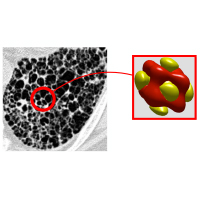3D Steerable Filter Learning for Efficient Volumetric Image Analysis
Autumn 2017
Master Diploma
Project: 00348

The use of deep convolutional neural networks (CNN) for object recognition in computer vision has shown to provide excellent results in many applications. Deep CNNs learn multiple filters in each convolutional layer of a deep neural network architecture using backpropagation weight updates. A major drawback of the latter is the requirement of large amounts of training data and computational time to learn all pixel weights (i.e., free parameters) of the filters. Moreover, CNNs are not rotation-invariant and require extensive re-training with augmented data (e.g., rotated versions of the training images), which degrades the specificity of the learned filters. Steerable filters are used on image analysis as efficient and accurate rotation-invariant object detectors. They are excellent candidates to overcome these drawbacks. The 2D theory has been recently adapted to classification problems and applied to texture analysis. The goal of this project is to extend the framework to the 3D setting, where rotation-invariance is even more important. This presents both mathematical and implementation challenges.
- Supervisors
- Adrien Depeursinge, adrien.depeursinge@epfl.ch, 021 693 5115, BM 4141
- Michael Unser, michael.unser@epfl.ch, 021 693 51 75, BM 4.136
- Julien Fageot, julien.fageot@epfl.ch, BM 4.139, Tel: 021 693 3701